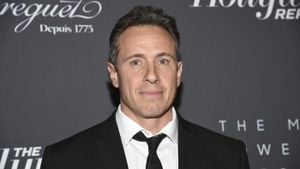With the ink barely dry on the election results, Donald Trump is already making significant moves as he gears up for his anticipated second term. After decisively defeating Vice President Kamala Harris on November 5, Trump is not wasting any time appointing key members of his upcoming administration. Among those named are South Dakota Governor Kristi Noem as Secretary of Homeland Security, and appointed positions like Susie Wiles as Chief of Staff and Florida Rep. Mike Waltz as National Security Adviser. This well-planned transition aims to solidify Trump’s grip on power as he prepares for his inauguration set for January 20, 2025.
One of the standout announcements from Trump is the hiring of billionaire Elon Musk and Vivek Ramaswamy, entrepreneur and former presidential hopeful, to lead the newly proposed Department of Government Efficiency (DOGE). This initiative, which Trump has described as potentially creating “shockwaves through the system,” plans to address the long-standing issue of government waste and inefficiency. Trump, asserting the need to “dismantle government bureaucracy,” explained the duo's mission will focus on cutting excessive regulations and restructuring federal agencies to create a leaner government.
Trump’s statement about the DOGE reflects his long-standing belief in trimming government size to improve operational efficiency. He noted the department is not meant to be another government agency but rather will function as a consultative body, working alongside the White House to spur structural reforms. Trump remarked, “Together, these two wonderful Americans will pave the way for my Administration to dismantle government bureaucracy, slash excess regulations, cut wasteful expenditures, and restructure Federal Agencies.”
Musk, known for his aggressive approach to business, echoed the sentiment of significant reform. He stated, “This will send shockwaves through the system, and anyone involved in government waste, which is a lot of people!” This new initiative will tackle the staggering $6.5 trillion annual government spending, with the goal of “liberate[ing] our economy and making the US government accountable to the people.”
On the defense front, Trump has nominated Pete Hegseth, the Fox News host and decorated Army veteran, to be his Secretary of Defense. Hegseth is noted for his staunch advocacy for troops and criticism of current military policies he deems overly liberal. “Nobody fights harder for the Troops, and Pete will be a courageous and patriotic champion of our 'Peace through Strength' policy,” Trump stated. This nomination will also need Senate approval.
Following suit, John Ratcliffe, who previously served as Trump's Director of National Intelligence, has been nominated to lead the CIA. Trump's announcement of Ratcliffe was underlined by his previous experience and dedication to safeguarding constitutional rights. Ratcliffe’s tenure promises to blend continuity with Trump’s broader strategic vision for national security.
Kristi Noem's elevation to Homeland Security Secretary marks another significant appointment. Tasked with overseeing immigration policy, disaster response, and Secret Service operations, Noem has previously built her reputation on staunch conservative principles, aligning closely with Trump’s agenda. She is expected to work hand-in-hand with the appointed “border czar,” Tom Homan, to fortify border security measures.
Another noteworthy appointment is former governor Mike Huckabee as the ambassador to Israel. Huckabee, recognized for his unwavering support of Israeli interests, has made headlines for his provocative remarks on Israel’s rights to the West Bank. Trump touted Huckabee’s affection for Israel, emphasizing how Huckabee is viewed favorably by Israeli leaders, thereby continuing Trump’s administration's pro-Israel policies.
The ripple effects of these appointments may well shape the political fabric of the U.S., as Republican lawmakers align themselves with Trump's distinct strategy for governance. Amid the excitement of these announcements, it is important to note the legislative challenges awaiting the incoming administration. House Speaker Mike Johnson has remarked on the lessons learned from Trump’s first term, where chaos often surrounded legislative initiatives, hinting at the need for more coordinated efforts this time around.
With Congressional Republicans reportedly just two seats shy of maintaining their majority, the stakes are high for the incoming administration as well as the party’s broader strategy for next year's legislative agenda. Trump aims to meet with lawmakers to align on foundational goals, reinforcing the narrative of his return to the White House as one of restoration and reform across various fronts.
Overall, Trump’s cabinet picks signify not just his intention to continue his previous policies but also to bring new faces and ideas aimed at revitalizing the government’s operational effectiveness. The appointed leaders, particularly Musk and Ramaswamy, hint at bold reforms encapsulating Trump’s vision of reshaping government responsibility, efficiency, and accountability, asserting his dominance as he embarks on what he believes could be the “Manhattan Project of the current time.”



